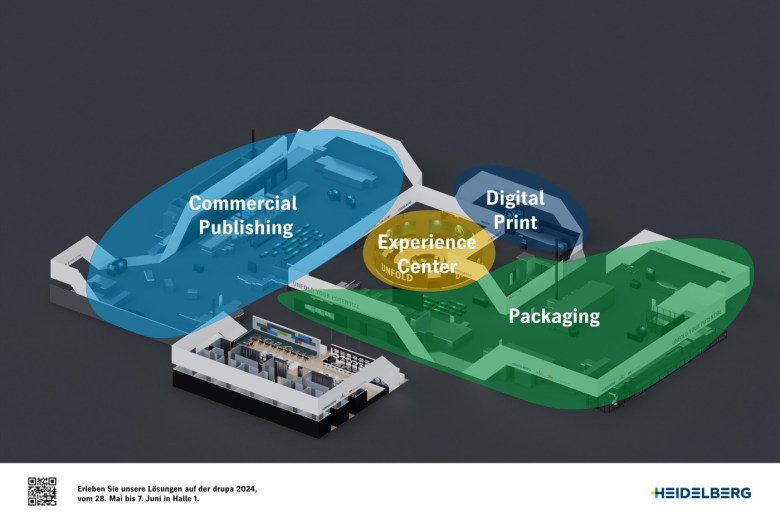
Above: In Hall 1 at drupa 2024 in Düsseldorf, HEIDELBERG will be showcasing end-to-end workflows for packaging and commercial printing
The printing sector is facing a combination of three challenges – ever-increasing cost pressures, a shortage of skilled workers, and growing sustainability requirements.
In response to these megatrends, Heidelberger Druckmaschinen AG (Heidelberg) will be presenting numerous innovations under the motto “Unfold Your Potential” at this year’s drupa trade show.
The focus will be on customers and the need for their print shops to optimise the development and leveraging of business potential using state-of-the-art technologies and services.
Thanks to the innovations being unveiled at drupa, such as the new-generation Speedmaster XL 106, Heidelberg can support its customers with a holistic concept that delivers up to 20 per cent higher productivity than the previous solutions.
“Heidelberg has been an industry pioneer in the digitalisation of printing for 20 years. Our main goal is to optimise our customers’ entire value chain,” said Heidelberg CEO Dr. Ludwin Monz.
“To this end, we have almost fully digitalised and integrated print shop processes, and our solutions at drupa offer our commercial and packaging printing customers maximum efficiency in industrial print production.”
The key topics in brief:
- How can printing businesses make their production more efficient?
Increasing cost pressures are forcing print shops to make ongoing investments in maintaining their competitiveness – i.e. in higher productivity, enhanced efficiency, and new areas of business. Innovations such as the new Peak Performance generation of the Speedmaster XL 106, with its higher print speed of up to 21,000 sheets per hour, AI-supported assistance systems, and enhanced Push to Stop functions, are making industrial offset printing even more competitive.
Heidelberg will be exhibiting another innovation, too – the efficiency of the Boardmaster is setting new productivity standards in the packaging printing industry. The new Boardmaster is a flexographic web printing system that boasts machine availability of up to 90 percent and a maximum printing speed of 600 meters per minute. Compared with the previous generation, its machine concept dramatically reduces the total cost of ownership in industrial packaging production.
- How can print shops respond to the shortage of skilled workers?
The shortage of labour and skilled workers is becoming more and more acute in the printing industry, too. Heidelberg is offering customers solutions for automating products and processes, including training for print shop staff. Fully automated Plate to Unit plate logistics on the Speedmaster XL 106 and the new robotics solutions for postpress operations are two examples of this in commercial printing. The new-generation Speedmaster XL 106 also supports cluster production, whereby a single operator controls an entire machine park. In the future, Heidelberg will make autonomous printing possible for standardised applications in packaging printing. The company will also help operators with more complex print jobs by providing navigated user guidance.
- How can the printing sector produce sustainably and yet economically?
Sustainability in print production is one of the biggest trends worldwide and, at the same time, a major challenge for the sector. Modern print shops are aiming to become even more sustainable by reducing their consumption of energy and resources. Print products are also changing, though, moving away from plastic and toward more paper. Heidelberg offers sustainable print solutions, helping its customers to make savings on energy and raw materials. If you compare a Speedmaster from 1990 with the current version, the energy consumption per 1,000 sheets has been reduced by up to 40 per cent. At this year’s drupa, Heidelberg will be presenting its latest generation of presses, which have a maximum speed of up to 21,000 sheets per hour. This increased production speed will help customers further lower their energy consumption per sheet. What’s more, the use of artificial intelligence and new assistance systems will also result in paper being saved by reducing the amount of paper waste.
- How is the printing industry benefiting from digitalisation? Digitalisation in the printing industry enables end-to-end integration of the production process – from receiving the digital customer order, preparing the print data, planning and carrying out the print job, and passing on the print product to postpress, all the way through to delivery and billing. In this context, Heidelberg will be exhibiting end-to-end autonomous printing for commercial and packaging customers at drupa. With its new customer portal, the company is taking digitalisation to the next level and further expanding press management, including aspects such as capacity utilisation, maintenance, and upkeep
- drupa 2024 – “Unfold Your Potential” in Düsseldorf and Wiesloch-Walldorf
Heidelberg will be demonstrating in two different locations how printing businesses can boost their capacity. In Hall 1 in Düsseldorf, the company will be exhibiting a highly automated end-to-end packaging workflow for the diverse requirements associated with industrial packaging production. Its focus will be on how to become more competitive when faced with cost pressures and changing conditions. Also in Hall 1, commercial and publishing printers will find a workflow that benefits from end-to-end connectivity thanks to Prinect. In the Experience Center, Heidelberg will be showcasing the wide range of services that extend beyond press technology as such, with AI-based analysis tools, intelligent assistance systems, online services, and sustainable production solutions all on show.
At the Heidelberg site in Wiesloch-Walldorf, the focus will be on business potential right across the Heidelberg portfolio. Here, the company will be exhibiting its entire product range, including presses and software solutions for all market segments – from commercial and packaging to label printing, from sheetfed offset and digital to flexo printing, and from products for small companies to fully automated production lines.
Comment below to have your say on this story.
If you have a news story or tip-off, get in touch at editorial@sprinter.com.au.
Sign up to the Sprinter newsletter
